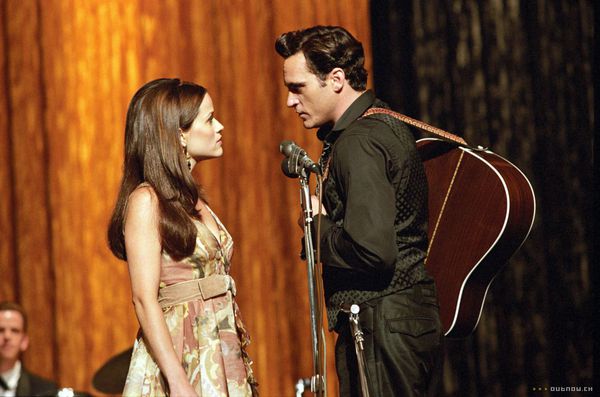Eye For Film >> Movies >> Walk The Line (2005) Film Review

For Johnny Cash, love was a burning thing. So, too, were antidepressants and alcohol, but it is love that takes centre stage in Walk The Line, an arresting, unflinching and, at times, intoxicating film.
Following the same tracks as Taylor Hackford's 2004 biopic Ray, this is the story of a musician who overcomes a troubled past to achieve fame and fortune by bringing an original sound to the microphone. This fortune is quickly followed by the development of drug dependency, which is then replaced by a few weeks of shivering and sweating as the faded star finds a reason to live and returns to his former glory.

Although the plot is a tired one, Walk The Line avoids hitting any dud notes, thanks to the excellence of the two leads, Joaquin Phoenix as Johnny Cash and Reese Witherspoon as June Carter, as well as James Mangold's intimate, yet stylish, direction.
Phoenix, who was charming and subtly comic in his support role in Signs, resurrects the Man in Black very impressively. Aside from his near identical vocalisation, he brings a commitment to the role that allows his performance to remain respectful whilst carrying the impact of an unrestrained interpretation of Cash's character. He learnt to play the guitar, sung all of the songs himself and improvised at times, such as the scene in which he destroys his guitar and rips a sink from the wall of his dressing room, all of which was unscripted.
Despite Phoenix's excellence, Reese Witherspoon manages to stay out of his shadow, being both humorous and sympathetic, while shaking off her typecasting from such forgettable rom-coms as Legally Blonde and Sweet Home Alabama.
The pacing is well timed, not quite following the train-like rhythm of most of Cash's canon, but well suited to the subject matter of his songs, which is bleak, yet somehow upbeat, reflected by Cash's constant love for June Carter, which is portrayed as being the main reason for his decision to turn his life around.
The film is very enjoyable to watch (despite the drug comas), achieved through a combination of comedy - Cash's unrelenting attempts at getting Carter to marry him - and concert footage, which is electrifying. Mangold's direction excels here, remaining close on Cash, circling around him and focusing on his reaction to his performance, rather than that of the audience.
This approach is altered at the final concert, where Cash performs to the inmates of Folsom Prison. Here, we see a changed man, sweating, swearing, married and, most importantly, happy, which is why Mangold allows us to see more of the audience. Cash's self-interest has subsided and he can now perform for the people, not just Carter or himself, something, which is amplified in the following scene (the last of the film) where he compliments his father for the first time.
Finally, he can walk the line between love and hate, life and death, being faded or being famed, it doesn't matter, as now that line is not blurred by drink, or drugs.
Reviewed on: 05 Feb 2006



















